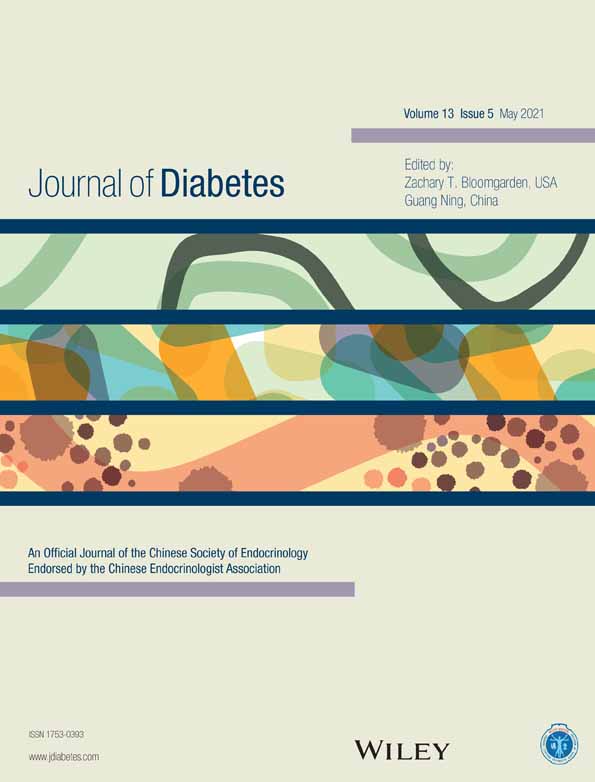Efficacy and safety of DPP-IV inhibitors combined with basal insulin in the treatment of type 2 diabetes
DPP-IV抑制剂联合基础胰岛素治疗2型糖尿病的疗效和安全性
Funding information: Natural Science Foundation of China, the Planned Science and Technology Project of Hunan Province and National key research and development program.
Abstract
enBackground
To evaluate the efficacy and safety of dipeptidyl peptidase IV (DPP-IV) inhibitors when added to insulin therapy in patients with type 2 diabetes mellitus (T2DM).
Methods
PubMed, EMBASE, the Web of Science, and the Cochrane Library were systematically searched for randomized controlled trials (RCTs) exploring the efficacy or safety of DPP-IV inhibitors in T2DM patients. The quality of the included RCTs was assessed with the Cochrane risk-of-bias tool. For outcomes, odds ratios or weighted mean differences (WMDs) with 95% CIs were calculated using both random- and fixed-effects models.
Results
A total of 16 studies were included in the meta-analysis with 5418 participants. Glycosylated hemoglobin (HbA1c) was significantly decreased in the DPP-IV inhibitors with insulin (DPP-IVi/INS) group compared with the insulin-alone (with or without placebo) group (WMD = −0.62%; 95% CI: −0.74, −0.49; P < .05). Consistent with this finding, the fasting blood glucose (FBG)-lowering effect (WMD = −0.61 mmol/L; 95% CI: −0.77, −0.45; P < .05) and 2-hour postprandial glucose (2hPPG)-lowering efficacy (WMD = −2.39 mmol/L; 95% CI: −2.81, −1.97; P < .05) in the DPP-IVi/INS group were also significantly better than in the insulin-alone group. Regarding safety indicators, compared with the insulin-alone group, DPP-IVi/INS treatments had no association with the risk of adverse effects, including hypoglycemia, adverse events (AEs), and serious adverse events (SAEs).
Conclusions
Compared with insulin treatment alone, treatment with DPP-IVi/INS improved HbA1c, FBG, and 2hPPG without increasing the risk of hypoglycemia, AEs, or SAEs.
摘要
zh目的
评价二肽基肽酶IV(DPP-IV)抑制剂在使用胰岛素治疗的2型糖尿病(T2DM)患者中的有效性和安全性。
方法
系统地检索了PubMed、EMBASE、Web of Science和Cochrane Library数据库中探讨DPP-IV抑制剂对T2DM患者的有效性或安全性的随机对照试验研究(RCT)。采用Cochrane风险评估对纳入的随机对照试验进行质量评估。使用随机效应模型和固定效应模型对结果计算95%可信区间(95%CI)、优势比(OR)或加权平均差异(WMD)。
结果
共有16项研究纳入meta分析, 共有5418名参与者。糖化血红蛋白(HbA1c)在DPP-IV抑制剂联合胰岛素(DPP-IVi/INS)组与单纯胰岛素组(加或不加安慰剂)相比显著降低(WMD=−0.62%;95%CI:−0.74, −0.49;P<0.05)。与此结果一致, DPP-IVi/INS组的空腹血糖(FBG)降低效果(WMD=−0.61 mmol/L;95%CI:−0.77, −0.45;P<0.05)和餐后2小时血糖(2hPPG)降低效果(WMD=−2.39 mmol/L;95%CI:−2.81, −1.97;P<0.05)也明显优于单纯胰岛素组。在安全指标方面, 与单纯胰岛素组相比, DPP-IVi/INS治疗与不良反应[包括低血糖、不良事件(AEs)和严重不良事件(SAEs)]的风险无关。
结论
与单纯胰岛素治疗相比, DPP-IVi/INS治疗改善了HbA1c、FBG和2hPPG, 而不会增加低血糖、AEs或SAEs的风险。
CONFLICT OF INTEREST
All authors declare that there is no conflict of interest.




